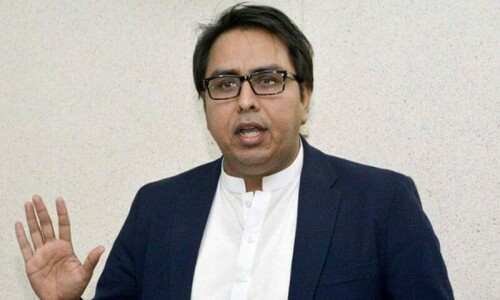LAHORE: The Punjab police’s core committee on Saturday finalised recommendations for reforms and submitted to IGP retired Capt Arif Nawaz Khan for final consideration before presenting the same to Prime Minister Imran Khan.
After a brainstorming session, the committee has proposed that there is no need to go for new reforms in the presence of the Police Order 2002.
The committee recommended to the IGP that the Police Order 2002 should be presented to the prime minister with a request to implement it in letter and spirit in the province.
The PM had set one-week deadline to the IGP and Punjab Chief Minister Usman Buzdar to prepare fresh reforms in a meeting in Islamabad on Monday last.
Mr Arif had constituted a core committee of senior police officers of Punjab to prepare a draft [of the reforms] as per instructions of the prime minister.
Core committee recommends implementation of 2002 law in letter and spirit
The committee which held its last concluding meeting on Saturday comprised additional IG internal accountability branch (IAB) Azhar Hameed Khokhar, additional IGP operations Inam Ghani, DIG information and technology (IT) Zulfiqar Hameed, DIG legal Jawad Dogar, DIG IAB Ahsan Yunis and DIG logistics Rai Babar Saeed.
An official privy to the information told Dawn that all participants in the committee were unanimous in proposing that the Police Order 2002 was a best model and a credible document to implement in Punjab according to its true spirit.
In addition to that, it has proposed that the prime minister may be requested for implementation on the directions of Chief Justice of Pakistan/Chairman Law & Justice Commission Justice Asif Saeed Khan Khosa and the Police Reforms Committee constituted by former CJP Mian Saqib Nisar comprising reputable retired and serving IGPs of the country.
He said the committee was of the view that the Police Order 2002 had addressed all those points/issues raised by the recently introduced police reforms by a committee of the interior secretary.
The Police Order could not be implemented in letter and spirit since then, severely affecting operational autonomy and performance of the police as per public expectations. He said the committee had highlighted the perspective and salient features of the Police Order in order to brief the PM about its significance.
According to it, the Police Order was promulgated on Aug 14, 2002 as Chief Executive’s Order and it replaced the police Act of 1861 (V of 1861).
Its primary objective was to reform the police and meet expectations of the public. The 2002 law had made the police accountable to the people.
In order to achieve the objectives set out in the preamble of the Police Order 2002, a number of institutions for public oversight and establishing checks and balances were to be established,” the official said.
These included, among others, public safety commissions at the district, provincial and federal levels. It also listed a large number of reforms in terms of the structure of the police service (e.g. separation of watch and ward from investigation).
Quoting the core committee’s decision, the official said no public safety commission had been notified since then as per the 2002 law for ‘public accountability of police’, which was based on ‘Japanese Model of community policing.’
Similarly, he said, the implementation upon security of tenure provided by the Police Order 2002 to the IGP of the province and other field officers to give them a sufficient time to show performance, was partially executed.
He said the committee also declared that in addition to the accountability process provided in the 2002 law, there were several other forums available to ‘grill’ the police and keep a check on them.
Primarily, they included anti-corruption department, the Punjab Service Tribunal, chief minister inspection team, delegation of powers to the courts for registration of cases under sections for 22 A and 22 B and chief executive of the province.
The core committee wants the IGP to take up the issue of resources for the police force in order to come up to the expectations of public at large.
Published in Dawn, October 6th, 2019













































Dear visitor, the comments section is undergoing an overhaul and will return soon.